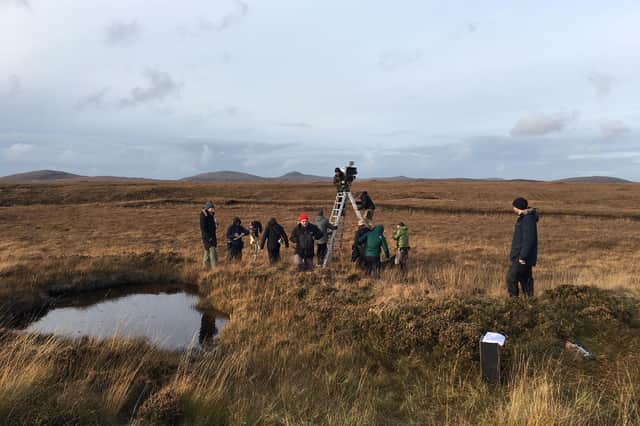Remote Hebridean islands set for world cinema spotlight for refugee drama


But the Uists could be set to bask in the world cinema spotlight after the first feature film shot there was chosen as one of year’s best new movies.
Organisers of the Cannes Film Festival have chosen Limbo, which focuses on the relationships formed between a group of male refugees stuck on a remote Scottish island as they await news on whether they are to be granted asylum to remain in the country in their “official selection” for 2020.
Advertisement
Hide AdAdvertisement
Hide AdCharting the events which unfold following the arrival of a gifted young Syrian musician who has been separated from the rest of his family, it is said to “shine a light on the hearts and lives of those at the centre of a crisis” in a portrayal far removed from media depictions of refugees and asylum seekers.
The film is by Edinburgh-based writer and director Ben Sharrock, who had not visited the Uists before he penned the screenplay there.
His story was partly inspired by time he spent at Damascus University in Syria as part of an Arabic and politics degree at Edinburgh University in the run-up to the civil war breaking out and the later resettlement of refugees on Scottish islands like Bute and Lewis.
Limbo, which was awarded £500,000 in funding from government agency Screen Scotland and has also been backed by Film 4 and the BFI, is billed as “a funny and poignant cross-cultural satire, that subtly sews together the hardship and hope of the refugee experience”.
Sharrock said: “The idea for the film really goes back to the time I spent studying in Syria the year before the civil war started. When that happened I was obviously really reflecting on my time there and the friends I had made, but also on the representation of refugees in the mass media. I felt there was something missing.
“On the one side migrants were being demonised, while on the other they were being pitied, which was also dehumanising. It felt like there was a gap in the middle where the media couldn’t get past the labeling of refugees. It was around about this time that I really started to develop an interest in filmmaking.”
Limbo is the second feature film made by Sharrock, a graduate of the screen academy at Edinburgh Napier University.
Advertisement
Hide AdAdvertisement
Hide AdHe added: “I knew I really wanted to make something about refugees and I was very interested in remote and wintry environments.
“Back in 2015 I went out to the Reykjavik Film Festival and did a location scouting tour around the north-west fjords in Iceland. I went down the route of a story about a group of refugees set in an Arctic environment for quite a while, but then decided to do something closer to home.
“The story is very much based on two different realities in different parts of Europe. Refugees have obviously been sent to Scottish islands, but they had refugee status and were able to integrate into society. In the film it is very different as the characters are asylum seekers. In places like Scandinavia it is very common for them to be sent to small, remote communities.
“I’d been to Skye and the Highlands before, but had never really been to a remote Scottish island like the one I had in my head. Uist actually came about because when I looked on the map it was the place I’d never heard of.
“I went there and stayed in a small cottage with a peat fire in South Uist. I had no signal and no internet. I’d write every morning and in the afternoon I would drive around, take photographs and think about the setting.”
Shot in six weeks in the autumn of 2018, including regular filming in conditions described as “just below gale force” by Sharrock, Limbo features real-life refugees in Scotland and islanders, alongside established actors.
London-born Amir El-Masry, who plays the main character, Omar, said: “It was tough filming there in the autumn with the wind. No two takes were the same.
Advertisement
Hide AdAdvertisement
Hide Ad“But it was also very useful as an actor to help get into the mind-frame of someone who has made that journey there and also in terms of physical intensity.
“Coming from a very busy urban city, I really appreciated the quiet. It brings your focus to the fore. It felt like a gift.
We only had the project and each other to focus on.
“It was a community of some of the nicest people I’ve ever met. It was as if it was their movie as much as Ben’s.”
A message from the Editor:
Thank you for reading this story on our website.
While I have your attention, I also have an important request to make of you.
With the coronavirus lockdown having a major impact on many of our advertisers - and consequently the revenue we receive - we are more reliant than ever on you taking out a digital subscription.
Subscribe to scotsman.com and enjoy unlimited access to Scottish news and information online and on our app.
With a digital subscription, you can read more than 5 articles, see fewer ads, enjoy faster load times, and get access to exclusive newsletters and content.
Visit www.scotsman.com/subscriptions now to sign up.
Advertisement
Hide AdAdvertisement
Hide AdOur journalism costs money and we rely on advertising, print and digital revenues to help to support them.
By supporting us, we are able to support you in providing trusted, fact-checked content for this website.
Joy Yates
Editorial Director
Comments
Want to join the conversation? Please or to comment on this article.